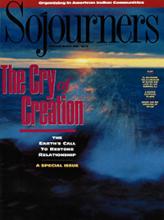When the May Day celebrations were held in the late 1980s in Archangel in the Soviet Union, most flags in the parade were green rather than red. The parade had been overtaken by local ecology groups, the fastest growing informal organizations throughout the USSR. Alexei Yablokov, who heads the Academy of Sciences biology institute, said that 20 percent of Soviet citizens lived in "ecological disaster zones." And the editor of Novy Mir, the famous Soviet literary journal, said that the country's ecological crisis confronted them with profoundly "spiritual issues."
Throughout the world, ecological issues have been seizing center stage in recent decades. Within the Third World, ecological threats are increasingly being understood as linked to the perpetuation of economic injustice. In concrete situations, and among the thousands of self-help grassroots groups found in these nations, justice and ecological preservation are seen as interdependent parts of one whole.
But despite a truly incredible mushrooming of ecological groups in every corner of the globe, and the rhetorical embrace of environmental issues by most of the world's leading politicians, not much is happening to save the globe from ecological catastrophe. In a quite literal sense, the world is heading toward physical death; it is afflicted with a growing illness and decay caused by humanity's ecological transgressions.
Read the Full Article

